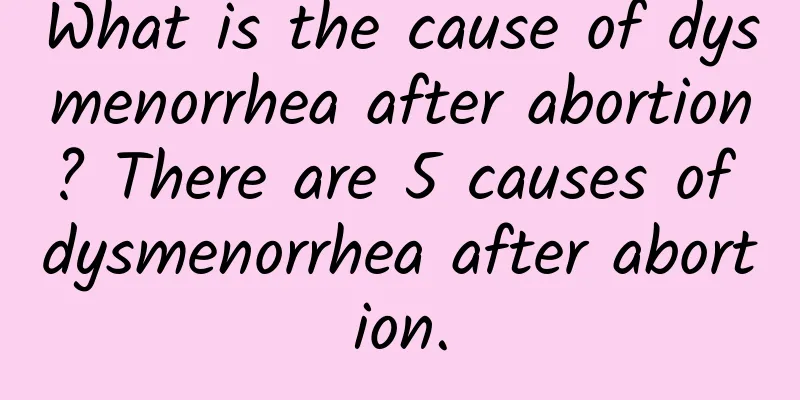What is the cause of dysmenorrhea after abortion? There are 5 causes of dysmenorrhea after abortion.

|
Many female friends have experienced miscarriage. Some have had artificial abortions because of unexpected pregnancies, while others have miscarriages due to embryo problems. Some female friends experience dysmenorrhea after miscarriage. For female friends who have this situation, they must want to know the cause of dysmenorrhea. So, what are the causes of dysmenorrhea after miscarriage? Causes of dysmenorrhea after miscarriage 1. Changes in uterine position Many female friends originally had an anterior uterus, but after a miscarriage, due to surgery, the uterus becomes retroverted or even retroflexed, which makes it easy to experience dysmenorrhea. Therefore, one of the common causes of dysmenorrhea after miscarriage is the change in the position of the uterus. 2. Inflammatory infection After a miscarriage, a uterine curettage operation may be required. If the relevant instruments are not strictly disinfected during the operation, it is likely to cause iatrogenic infection, resulting in dysmenorrhea after miscarriage. 3. Gynecological inflammation Some female friends do not pay attention to personal hygiene after abortion, which leads to gynecological inflammation, which can easily lead to dysmenorrhea. In addition, if you start having sex again soon after abortion, it is also easy to cause gynecological inflammation and dysmenorrhea. 4. Cold Women who have had an abortion need to take good care of themselves, and it is best to have a short confinement period, which can help the uterus recover as soon as possible. If you do not pay attention to rest, keep warm, or even come into contact with cold water right after the abortion, it is likely to cause the uterus to catch cold, resulting in dysmenorrhea. 5. Endocrine disorders If it is a normal pregnancy but you want to terminate it through abortion, it is likely to cause endocrine disorders, which can easily cause dysmenorrhea. What are the causes of dysmenorrhea after miscarriage? The above introduces the five major causes of dysmenorrhea after miscarriage, namely, changes in the position of the uterus, inflammatory infection, gynecological inflammation, cold and endocrine disorders. These five major causes are the main causes of dysmenorrhea after miscarriage. Female friends who encounter such situations should go to the hospital for relevant examinations and symptomatic treatment in time. |
<<: What is the best method for abortion at the age of 45? What are the common methods of abortion?
Recommend
Meridian weight loss is effective! To balance your Qi and blood, learn these two tricks first
Obesity is the root of all diseases. Utilizing me...
What are the methods of medication for mild cervical erosion? A guide to medication for mild cervical erosion in women
Cervical erosion is a common disease among women,...
What are the characteristics of menopause?
Many women will have great changes in temper duri...
What is the treatment for cervicitis?
Cervicitis often causes great distress to female ...
Understand the causes of cervical erosion in women
Women's health is very important to people, a...
Are there any serious risks of abortion after cesarean section? Women should be aware of the risks of abortion after cesarean section.
Caesarean section surgery requires peeling open t...
What are the medicinal diet methods for thick endometrium
Many gynecological diseases are very harmful to w...
How much does it cost to treat endometriosis?
How much does it cost to treat endometriosis? How...
The King of Herbs, American Ginseng, Can Effectively Relieve Cancer Fatigue
In traditional Chinese medicine, ginseng is known...
How to treat cervical erosion in pregnant women? Pregnant women should pay attention to the treatment of cervical erosion
Nowadays, many pregnant women are diagnosed with ...
Drinking soy milk before meals is more effective in losing weight and burning fat
How to diet to lose weight? The editor below will...
Is it necessary to have a uterine curettage after medical abortion? What are the specific circumstances of a uterine curettage?
It is not necessary to perform uterine curettage ...
Don't play the Hunger Games when you reach a bottleneck in weight loss
[Key points]: The happiest time for weight loss i...
How much does it cost to induce abortion in Hangzhou
How much does induced abortion cost in Hangzhou? ...
The beauty Jung Da-yeon's private cooking with a travel cup is revealed
Zheng Da Yan, who is known as the "originato...









